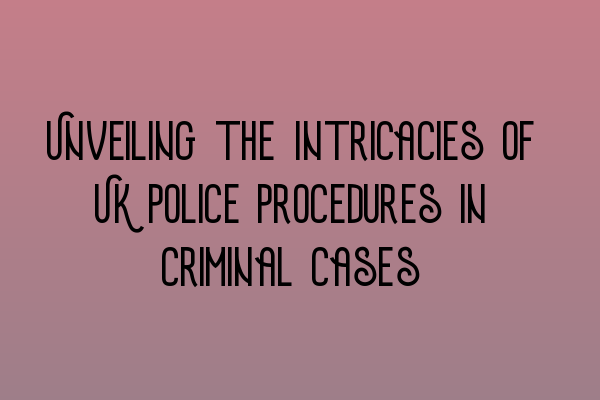Unveiling the Intricacies of UK Police Procedures in Criminal Cases
As criminal defense solicitors, it is essential for us at SQE Criminal Law & Practice Law UK to have a comprehensive understanding of the intricate procedures followed by the UK police in criminal cases. These procedures play a crucial role in shaping the course of criminal investigations and subsequent legal proceedings. In this blog post, we aim to shed light on these procedures, demystifying their complexities and enabling you to grasp their significance.
1. Arrest Procedures:
When a crime is reported, the police have the power to arrest individuals suspected of committing the offense. Arrests can occur with or without a warrant, depending on the circumstances. It is important to note that the police must have reasonable grounds for suspecting the individual’s involvement in the crime. Knowledge of these arrest procedures enables us to advise our clients appropriately and ensure that their rights are protected throughout the process.
2. Search and Seizure:
During criminal investigations, the police may conduct searches to gather evidence or seize items that are believed to be connected to the crime. These searches can range from a person’s property to their electronic devices. Understanding the legal limitations and safeguards surrounding search and seizure is vital in ensuring that our clients’ rights are not violated and that any evidence obtained is legally admissible.
3. Questioning and Interviews:
Once a suspect is in custody, the police have the power to question and interview them. The purpose of these interactions is to gather information and evidence to aid in the investigation. It is important for individuals to be aware of their rights during these procedures, such as the right to remain silent and the right to legal representation. As solicitors, we ensure that our clients fully understand their rights and provide them with expert legal advice throughout the questioning process.
4. Detention and Release:
Following an arrest, the police may decide to detain the suspect for further investigation. Detention can last for a specified period, during which the police must provide regular updates and review the necessity of continued detention. If sufficient evidence is not found or if the investigation is completed, the suspect must be released. Understanding the provisions surrounding detention and release is crucial in protecting our clients’ rights and ensuring that they are not unlawfully held.
5. Charging and Bail:
Once the police have gathered enough evidence, they can decide whether to charge the suspect with a criminal offense. This decision is made in consultation with the Crown Prosecution Service (CPS). If charged, the suspect may be eligible for bail, subject to certain conditions. As solicitors, we play a vital role in representing our clients during bail hearings and advocating for their release or favorable conditions of bail.
By familiarizing ourselves with these intricacies of UK police procedures, we are equipped to provide our clients with expert legal representation at every stage of their criminal cases. Our knowledge and understanding of these procedures enable us to identify any procedural irregularities or breaches of our clients’ rights, which we can tactically exploit to their advantage.
If you are preparing for a career in criminal law or are currently studying for the SQE 1 or SQE 2 exams, we recommend checking out our related articles for further guidance:
– [SQE 1 Practice Exam Questions](https://fqps.co.uk/sqe/sqe1-preparation/mcq-practice-quiz)
– [SQE 1 Practice Mocks FLK1 FLK2](https://fqps.co.uk/sqe/sqe1-preparation/practice-mocks-quiz)
– [SQE 2 Preparation Courses](https://fqps.co.uk/sqe/sqe2-preparation)
– [SQE 1 Preparation Courses](https://fqps.co.uk/sqe/sqe1-preparation)
– [SRA SQE Exam Dates](https://fqps.co.uk/sqe/sqe1-sqe2-exam-dates)
In conclusion, understanding the intricate procedures followed by the UK police in criminal cases is essential for criminal defense solicitors. By comprehending these procedures, we can better safeguard the rights of our clients, exploit any procedural irregularities, and provide effective legal representation.
